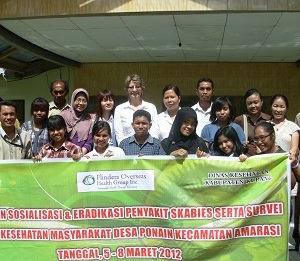Dermatology Programme

The dermatology programme comprises (1) general support of the Dermatology Department at Professor Johannes Hospital in Kupang with associated involvement of (2) teaching medical students and junior staff, as well as (3) an outreach service involving previous programmes in Kefamenanu, clinics in Naob, Halilulik and Atambua, and (4) specific programmes looking at the prevalence of scabies and infection in a near semi-rural community.
In the clinic situation in the hospital, a diverse range of patients are seen and discussed with the clinical team and multidisciplinary involvement with other specialities has been promoted. There have been a number of presentations made at the teaching sessions at Professor Johannes Hospital relating to skin disease, particularly severe infections, emergency skin presentations, neonatal skin disorders, and the impact of leprosy.
A large prevalence study of scabies and secondary infection was undertaken in conjunction with Undana Medical School, Professor Johannes Hospital Dermatology Department, and Microbiology/Laboratory Unit as well as the Public Health Puskesmas. This was extremely useful in providing data for health care providers, and the rates of infestation and infection were extremely high. This has allowed planning for better skin health approaches at both the primary care and referral levels.
More recently, there appear to have been increasing rates of cutaneous problems associated with leprosy infection in recent years, and this has sparked further interest to undertake a more substantial assessment of the problem in the surrounding districts of Kupang in the near future.
Over the years, there have been a broad range of dermatologic abnormalities identified with specific problems e.g. undertreatment of inflammatory diseases in the community such as eczema and psoriasis, high rates of infection with tinea and staphylococci infections, and primary autoimmune diseases such as vitiligo are not uncommon. The full gamut of dermatologic disease is seen in the population, and there will be further efforts in the future to provide an upskilling component to the general practitioners in the area.
Flinders Overseas Health Group has a commitment to increasing education in this area from medical students to senior consultants and within the community of the population in general and health workers together in the diagnosis of treatment in skin disorders.